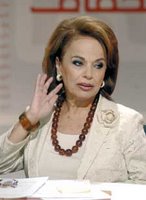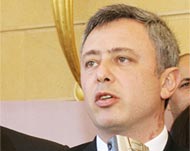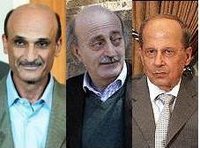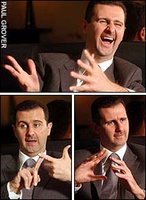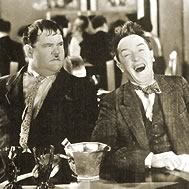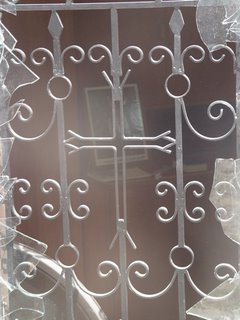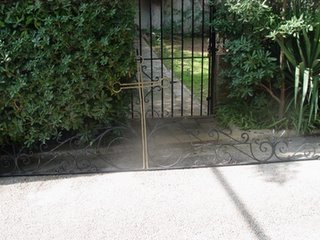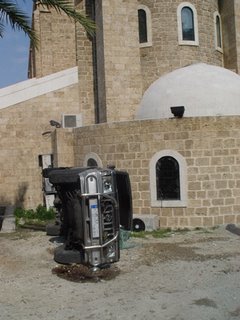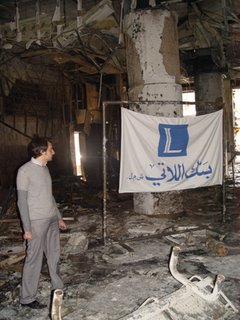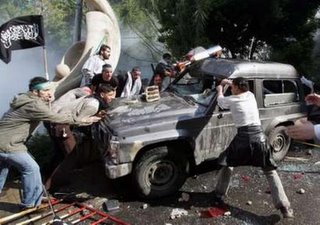The following are stories of men, women and children, whom I had met between December 24, 1992, and January 17, 1993, in Lebanon, living the first post war years of the country.
After the recent troubles, especially the riots in Achrafieh on Sunday, I read it again and it reminded me of the horrors of our not-so-distant history. Forgive me if it is a little too long.Kammal Dabbous, a 33 year old former Shiite militiaman, drives through Beirut's ravaged commercial center, which is the most obvious reminder of Lebanon's 15 year orgy of self destruction. This half square mile area called "Al Aswak" ("The Markets") saw the fiercest battles between rival Christian and Muslim militias.
Hundreds of burned out buildings still stand without windows or doors. Bombs of every caliber ripped open their facades. Bullets and anti tank rockets perforated hundred of thousands of dents in their concrete walls.
Dabbous, who as a 16 year old boy fought in this no man's land, smiles uneasily and says: "As a teenager, I was thrilled to carry a machine gun. Nobody told me then that it was wrong. Instead, the militias taught us how to fight. They told us that weapons are the decoration of men. We were encouraged to destroy."
But unfortunately, The Markets are not the only victims.
War broke out in Lebanon on April 13, 1975, after growing tensions between Muslims and Christians over the presence of Palestinian guerillas in Lebanon.
Lebanese Muslims and their Palestinian allies fought the Christian militias, dominated by the Phalangists. The Syrians, the Israelis, and the West intervened and got embroiled in the conflict.
Over the years, the Lebanese massacred and kidnapped one another. Christians even fought Christians, and Muslims fought Muslims.
The war ended on October 13, 1990, when Syrian tanks roared into Christian East Beirut, imposing an agreement signed between Muslim and Christian parliamentarians in the Saudi town of Taef. Although the war ended more than two years ago, its human sequels are still vivid.
The war killed 200,000 people and wounded 300,000 others. A hundred and six thousand people are handicapped as a direct result of the civil war, according to Caritas, the largest charity in Lebanon.
There are 17,500 missing persons, of whom 14,000 were kidnapped by Christian and Muslim militias. Odette Salem, the founder of Parents of the Kidnapped, believes that 1,500 Lebanese are still held hostage.
Three hundred thousand people were displaced during the war. Thirty percent of the displaced are Christians who fled their villages, after Christian and Druse militias fought each other in the mountains surrounding Beirut, according to a recent Ministry of Refugees report. The report adds that 25 percent of refugees are Shiites who escaped Israeli shelling and occupation of their villages in Southern Lebanon. The rest of the displaced are mainly Christians who escaped West Beirut and Muslims who escaped East Beirut.
Moreover, the Palestinians'war against Israel has not ended. There are still 300,000 Palestinian refugees in camps in Lebanon. They live in misery and their only goal is to return to their homeland.
The war crippled the once burgeoning Lebanese economy, plunging more than half the Lebanese into poverty. Water and electricity are still in very short supply.
On the social level, "Ghettos were created during the war," says Samir Khalaf, a Lebanese sociologist at Princeton University. "Close community and family relations were a cushion that protected the Lebanese." But he added that the same forces that enabled the Lebanese to survive are creating uneasiness in peace time.
An anarchical society developed in the war. The social contract failed. "Lebanon experienced the dismemberment of society," Khalaf says. "How will the Lebanese reassemble a society that experienced such an erosion of trust?"
Furthermore, the divisions in Lebanon have reinforced stereotypes. " Some Christians think that Muslims are black and dirty," says Anna Mansour, director at UNICEF. "Some Muslims say that Christians are infidels.
"The Lebanese are full of stereotypes caused by fear."
The Lebanese, however, faced the same traumas, and today they face the same hardships. "We [the Lebanese] were homogenized by fear and terror," says Khalaf.
As a result, 10 percent of the Lebanese experience post-traumatic stress disorders - PTSD - compared to 2 percent of U.S. citizens, according to Elie Karam, a psychologist at the Saint Georges Hospital in Beirut.
"A generation must pass before things go back to normal in Lebanon," Karam says. The generation of Lebanese on whom peace rests is the war generation the children who grew up in a divided and war torn Lebanon.
...Marta Abou Mitri will dress in black for the rest of her life. Pictures of her sons, Tony and Charbel, of her husband, Milad Abou Mitri, and of Jesus Christ hang on the walls of her one bedroom apartment in the Christian Hazmieh quarter of Beirut .
They are all pictures of dead men.
Abou Mitri is a stocky 59 year old woman. She has a goiter, deep and dark eye sockets, and shiny white hair. On December 26, 1992, she looks at the pictures, cries, lights up a cigarette and coughs heavily.
Tony was killed in 1976 at the age of 14. Abou Mitri said that Tony was playing with his friends when a sniper shot him. Abou Mitri, however, does not know the truth about her son's death. A friend and neighbor of the Abou Mitris, who wanted to remain anonymous, said that Tony joined the Christian militia and went to fight the Muslims in the Markets the night he was killed. His buddies in the Christian militia shot him by mistake.
A large framed picture of her son, Charbel, hangs alone on another wall in her apartment, which was destroyed in 1990 and only recently repaired. In this colored picture, Charbel has a thick black moustache and a thin beard, he is wearing dark Ray Ban glasses and a military uniform. He is carrying his M 16 machine gun in his right hand and a big smile fills his face.
In March 1990, Charbel, who was 24 years old, was killed while fighting the Christian militia. Abou Mitri, with tears running down her face, said that Charbel had joined the Lebanese army two weeks earlier. Abou Mitri, however, does not know how Charbel died. The friend of the family revealed that Charbel was about to fire a rocket launcher when the weapon exploded in his face.
When Charbel died, Abou Mitri removed all the pictures of Christ from the walls of her apartment. "I didn't want God," she remembers, "I didn't want Jesus. I wanted them to leave me alone."
But a few days later she hung the pictures back.
Nine months after Charbel's death, her husband Milad Abou Mitri, who worked at the Youth and Sports Council, died of a heart attack. "Milad suffered deeply because his son, Charbel, was very precious to him," Abou Mitri says.
Abou Mitri, like most Lebanese, has someone to blame for her tragedy. "I hate Samir Geagea, [the leader of the Christian militia]," Abou Mitri storms. "I damn him night and day."
She has refused to celebrate any feasts since her husband's death. Marta sits in her living room heated with charcoal burning on a rack. She sobs heavily and whispers: "I don't like to see feasts, I don't like feasts. I didn't celebrate Christmas this year or the year before. "My family came over with food on Christmas eve, but I told them to take it back home. I want to be miserable. I bear a heavy cross."
...In the apartment next to Abou Mitri's, Elie Nahas, a 36 year old phone technician at the American University of Beirut, lifts his father, Assaad Nahas, from his bed in the living room. Nahas leans his father's back against the wall, takes his father's feet and slips them into thick but torn socks. Nahas holds his father by the arms and slowly walks him to the bathroom. Everyday, Nahas washes, dresses and feeds his father.
Assaad, a former engineering professor at the AUB, suffers from diabetes. In 1986, a blood clot in the back of his neck paralysed him from the neck downward and impaired his speech. "The war had made my father very angry and tense," Nahas says. "This is why
he has ended up like this."
"In the beginning of our marriage, Elie was spoiled," Marie Constantine, 23, Nahas'wife, says. "I had to tidy his cupboard, prepare his meals and bring him his pyjamas. "Then the bad times came."
In 1988, Nahas married Constantine, who was 19 years old. They lived with his father and his mother, Zakiya. "The ugliest period of the civil war began the day we were married," says Nahas, a balding man with a long pointed nose. Indeed on that day, President Amin Gemayel named Christian General Michel Aoun Prime Minister. Aoun launched "the war of Liberation" against the Syrians in 1989, and then, in 1990, a war against the Lebanese Forces, the Christian militia.
On February 15, 1990, Nahas and his family hid from the heavy shelling in a relative's house, a few blocks away from theirs. At 4 p.m. precisely, a radio news flash announced that Aoun's army had won a major battle against the Lebanese Forces.
The shelling waned. There were 15 people including Nahas in the house. Some went back home. He stayed with his father in the passageway where they had been hiding. Constantine, who was 6 months pregnant, went to make Turkish coffee on a charcoal rack in the
living room with Terese Maalouf, the owner of the house, Zakiya, and Georgette Chaar, a neighbor.
While waiting for the water to boil, Constantine sat on a sofa facing the living room's window and put a pillow against her stomach. Chaar sat next to her. Constantine, kidding, said to Chaar: "Go sit in the chair in front of me. Protect me."
"No," Chaar replied. "If a bomb falls I wouldn't be able to run away." They laughed.
A shell landed in the middle of the room. Maalouf, Zakiya and Chaar were killed instantly. Constantine was badly wounded, but the pillow she was holding had protected her heart and stomach from shrapnel. But shrapnel entered the back of her skull, her legs, her arms, and her back.
When the bomb exploded, Nahas found himself lying on top of his father. He was covered with glass and dust. "I jumped," Nahas remembers. "I ran to the sitting room, screaming 'get out of here, get out of here.' I thought the shell had landed in the garden."
As he entered the living room, he saw his mother lying on her back; he thought she had fainted. He got close and shook her. No sign of life. He turned her. Her back was covered with shrapnel, and most of her bones were broken.
Constantine, however, was still breathing, Nahas carried her in his arms, rushed to his car and sped to the nearby Saint Charles Hospital.
In the car, Constantine woke up, but she felt she could not breath and thought she was dying. She prayed: "I beg you Saint Rita I want to see my parents again." Her thick pullover was covering her mouth and nose. she grabbed it and pulled it away
from her face. "I felt alive again," she recalls.
But then she looked at her legs. "I saw my knee opened like a flower," Constantine says. She fainted and remained unconscious for three days.
Constantine underwent 20 operations. She stayed in the hospital for six months. The doctors thought it was too risky for her to keep her baby because of the morphine and other drugs she was taking. So she had a caesarian. It was a boy.
"At the hospital I cursed God a hundred times a day," Constantine says. "I was in pain. But if it wasn't for him we would all be dead. Now I thank God for keeping me alive, I thank him for keeping my arms and legs."
Constantine's left arm, however, is paralysed, and she limps because she cannot bend her right knee.
In pictures before what she calls "the incident," Constantine had a plump face, red cheeks, and the freshness of youth glimmered in her eyes. Although Constantine has overcome her
tragedy and works hard both at her job and at home, her face is white and her eyes are weary.
Three months after Constantine left the hospital, war broke out again. This time her apartment was reduced to rubble. The first bomb blasted through Abou Mitri's kitchen into their bedroom. The second crashed through their bedroom window and exploded in their living room. The third entered through their living room's window and into Abou Mitri's bedroom, and the fourth crashed through the roof, through their living room and exploded in the flat beneath theirs. Luckily, nobody was in the building on that day.
"Elie [Nahas] and his cousins stayed a whole year rebuilding the house," Constantine sighs. "But we still can't afford a door between the living room and our bedroom."
Today Nahas and Constantine are facing hard times because of the hyperinflation that has hit the Lebanese economy since the war ended.
"I wish the war would come back," Constantine storms. "Is dying of hunger better? I would choose any day bombs and food over no bombs and no food."
Together Nahas and Constantine make $300 per month, which is not enough to buy food and pay for Assaad's insulin. So their families help them.
"There is no hope in Lebanon," Constantine says. "We work day and night just to survive. We have to pack up and get the hell out of this country."
Seventy year old Assaad, unshaven and wearing a bonnet, suddenly opens his eyes wide and shouts: "I am sorry I am lying like this. I am worth nothing."
"Father," Nahas replies, "in this country we are all worth nothing."
...Odette Salem will never stop looking for her children, Richard and Christine, who were kidnapped in 1985 on Sadat Street in West Beirut.
"The war has ended," says Salem. "But my nightmare hasn't. How can we talk of peace when I don't know where my children are?"
On Tuesday September 17, 1985, Salem cooked lunch for her children. They usually returned home from work at 2 p.m.. But, Richard, who was 23 years old, and Christine, who was 20 years old, were late.
Salem waited for them on the balcony of her house in the Sakiat al Janzir district in West Beirut. It was 3 p.m. and they still had not come. She phoned the Joseph Salem design company in Hamra Street, West Beirut, where Richard and Christine worked. She was told that they had left an hour ago.
She thought they had had a car accident, so she phoned all the hospitals in the capital. Nothing. She rushed to her neighbor, Colonel Issam Abou Zaki, who today is the national Chief of Police. He phoned the capital's precincts. Nothing. In August and September 1985, fifty Christians were kidnapped in West Beirut. Salem's children were among them. The Hezbollah, she says, kidnapped Richard and Christine to exchange them with Shiites, held by the Christian militia.
"During the war," she says, "I worried about bullets, bombs and mines. But I never thought my children would be kidnapped."
After news spread about the abduction, Salem received a phone call from a person demanding a ransom. "Three days after they were kidnapped," she recalls, " I received a phone call. A man asked me for 100,000 Lebanese Pounds [about $3000 at the time]." But the call was a prank.
Many people asking for money called her; but none knew where her children were.
Salem, whose husband died of a heart attack in 1982, says that she suffered from severe depression for the three years following her children's abduction. She was hospitalized several times. Now she lives on tranquillizer and can hardly fall asleep before 3 a.m.. She has suffered a slipped disk, a severe case of sinusitis; her kidneys need surgery urgently.
"I am a wreck," she says smoking her fourth cigarette in 40 minutes. "But I won't have surgery before I see my children. What if they are released and I am still in the hospital? Who would they go to? I am the only family they have left."
Her children have become her only purpose in living since 1985, when she founded the Parents of the Kidnapped Association. She has organized rallies and lobbied politicians and journalists. "Promises, promises, promises, is all I get from politicians," Salem says. "Last year, this idiot [former Prime Minister Omar] Karami told me, with a smile on his face, that there were no kidnapped left alive. I walked out of his office."
Indeed after the Lebanese Forces and the Hezbollah released 14 hostages in July 1991, the government considered the case closed. Salem, however, is convinced that her children are still alive.
"Last year," she says, "a former kidnapped [ whom she refused to name] told me that he was held with my son at the Sheik Abdallah barracks in Baalbak [once a Hezbollah stronghold]. "Now the [Lebanese] army took over the barracks, and they [Hezbollah] moved him."
She met with Hezbollah leaders, the Palestine Liberation Organisation, the Iranians. Nothing. Her crusade will continue until she sees Richard and Christine, dead or alive, she says.
Everynight Salem looks at the photo albums of her children and talks to their pictures. " This is all I have left," she says weeping. "I am living with their pictures."
...Dr. Elie Karam is a psychiatrist at the Saint Georges Hospital in Achrafieh, a quarter in East Beirut. He participated on a research project on depression around the world, directed by Dr. Myrna Weissman, a psychiatric epidemiologist at the New York state Psychiatric Institute and Columbia Presbyterian Medical Center. In December 1992, the study, which stated that depression is on the rise worldwide, was published in The Journal of the American Medical Association and in the New York Times. Karam also wrote a scientific paper on post traumatic stress disorder - PTSD.
His office is equipped with computers linked via satellites to U.S. computer libraries, which is very unusual in Lebanon considering that local phones rarely work. In another part of his office, is a framed handwritten letter that reads:
"Dear Elie,
The essential is that his blood pressure is normal and his arteries were not hit.
He received a metallic fragment that went between the carotid and the trachea without touching either of them. It got stuck to a vertebrae without wrecking the nerves.
Dr. Tawil is doing the necessary to get it out.
He also had a slight torso injury. It was treated. Everything is fine.
His left leg is fractured.
But All vital signs are all right. Thank God for that. He has no permanent wound. The kid will be normal.
Calm down. We are three surgeons and we are taking care of him.
[Signed:] Dr. Emile Riachi"
The kid referred to in the letter is Karam's son, Marc.
Riachi, an orthopaedic surgeon at the Saint Georges, sent this letter to Karam's house, a few blocks away from the hospital, on January 31, 1990, when the inter-Christian battle broke out in East Beirut.
On that day the shelling was intense in the Christian areas and Marc and his younger brother, Antony, were aboard a bus returning home from school. The bus was blitzing through Sin El Fil, a quarter in East Beirut, when it drove on a mine. Three children were injured, among them Marc and Antony, whose legs were injured, nose broken and eardrums pierced.
The children evacuated the bus and ran for shelter. In their flight, Antony and Marc saw a charred man's body in a burned out car. Once inside a building, Antony had the strength to phone his father and tell him what had happened.
"My wife [Aimee Karam] and I panicked and cried," Karam recalls. "I didn't run to rescue them. I was afraid of the shelling. I felt so silly because I was a coward."
The kids were taken to the Saint Georges Hospital where Karam and Aimee joined them. For three months Achrafieh, the area where the hospital is located, was under siege and under constant shelling. The Karams, whose apartment was hit by 26 shells, were stranded in the basement of the hospital for the whole period.
"There was little food in the hospital," Karam says. "We ate a lot of chocolate and bread."
In 1991, Karam attended a psychiatric conference in Washington D.C.; his kids were with him. Karam snuck into Antony's hotel room early one morning and found him awake but motionless. Later, Antony told Karam that he did not sleep all night because he felt a calcified man was lying next to him. Antony was frozen. He did not want the man to crumble.
Karam says that his children are still traumatized. "At home, when I turn on the loud speakers," Karam says, "and they make a loud noise, PAH, my children jump. My children still dream about the war, and they are terrified of thunder. Antony wasn't scared of thunder before the incident, but now he sleeps next to Marc when he hears it.
"But I never really knew what the fuck PTSD was about until I saw the driver of their school bus."
Karam described the driver's condition as numbness. Although he was not injured by the mine, the driver is still in a state of shock. He stopped driving, is withdrawn and cries for hours when he remembers the incident.
In 1980, when Karam, fresh from Washington University in Saint Louis, started his study on depression in Lebanon, his hypothesis was that war did not affect the psyche. "This was wrong," he says today. "The more you are exposed to war, the more you are crippled emotionally."
*
In 1976, Christian militiamen massacred and expelled the Palestinian and Shiite living in the Karantina Camp, next to the Beirut harbor. In December 1992, some Shiites returned to the camp to reclaim their houses, but they found Christian refugees occupying them.
In 1983, the Druzes militia had ousted these Christians from their villages in the Chouf mountains. And In December 1992, most Karantina Christian refugees also returned to their villages only to find their houses in ruins.
Youssef Merhej, 22, who lives with his parents in a shack in Karantina, says: "This is not our house. Its Muslim proprietors [he doesn't know their name] have the right to claim it back. One day, we will all go back home."
On September 6, 1983, the Merhej family and 600 villagers escaped from Moouch, a Christian Maronite village in the Chouf mountains. The Druse militia killed the villagers who had remained. Nemr and Lamia Merhej, who were laborers, and their seven children left all their belongings and their money in the village. They thought they would return in a couple of days.
They hid in the woods for the first night. The next night they found shelter a mile away from Moouch in the Mar Maroon Monastery. And then they walked for a day to the village of Deir El Kamar, which had become a refuge to all Christian villagers in the Chouf. Soon after, the Druse militia besieged Deir El Kamar.
Food became scarce. "My father [Nemr]," recalls Georgina Merhej, 18, "worked all day at the bakery to get us each a loaf of bread." Once they ran out of flour for three days: They ate biscuits and boiled snails.
When the siege ended in November 1983, the Merhej family moved to East Beirut. They lived in the Don Bosco Monastery for three years and then moved to Karantina. Youssef, who was 12 years old, stopped studying and worked with his father, Nemr, on construction sites. "The family had to survive," Youssef says. "No one, not even the priests at Don Bosco, helped us. We had to rely on ourselves."
Today, the Merhej family is anxious to return to Moouch, but their house is destroyed. "I like my village," says Charbel Merhej, 10. "But without the ruins." Charbel was two years old when he left the village, but he vows: "The Druzes will not kick us out again, I will kick them out this time."
His mother, Lamia, shouts at him: "Shame on you. We have to become brothers with the Druzes again."
The rest of the family agrees with Lamia. And Georgina enthusiastically pulls from her school bag a poem called "Striving for humanity", which she wrote a year ago, and reads it.
"Show me where we can find peace
Can we find it on earth, our birthplace?
No, there is never peace on earth,
Only suffering and wars;
No joy, no gaiety,
No love, no brotherhood.
Tears and cruelty is all we find
Tyranny and suffering.
Where can we find happiness?
Where can we find tenderness?
Away from Sadness,
Away from fear.
Let us search for an angelical life,
And run away from these evil surroundings.
Let us build the round device,
With love and help from everybody,
to change hell into paradise."
...Mohamad and Maryam Deeb live with their son, Kamel, 24, in a cabin amidst the ruins separating East from West Beirut. "I am ashamed of receiving guests," Maryam shouts. "I am not happy here. I want to go back home."
Home for Maryam is her three-room house in Chakra, South Lebanon. In the winter of 1986, the South Lebanese Army, Israel's ally, stole her savings, burned her house and tortured her son, she says.
The Israelis and their Lebanese proxies stormed into Chakra in retaliation for the killing of two Israeli soldiers. Kamel was 18 years old when the SLA caught him. He was fighting with the Amal (hope) branch of the Islamic Resistance. "We had to defend our villages," he says. "We knew that the Israelis overpowered us, but it is better to fight than to surrender. It is better to be made prisoner with honor than without. God gave us that land, and we have to fight for it."
The SLA took Kamel to a prison camp. " They made us [the prisoners] take our tops off," he says. "We were blindfolded and our hands were tied behind our back. They made us stand 17 hours outside in the cold."
Things soon got worse. The SLA beat up Kamel, and then they taught him how to "dance", he says. "I danced every time electricity penetrated my body," he says.
An SLA interrogator, Kamel says, used a 150 Amperes battery powered manually with a crank linked to cables. The torturer attached a cable on Kamel's hand, another on his back and sprayed him with water.
"He started electrocuting me with 24 volts," he says. "I didn't talk. So he went for 110 volts. Not continuous. Little shocks." Kamel told the SLA everything they wanted to know. Three days later they released him.
"When he came back to Chakra," Maryam recalls,"his skin was blue." Kamal's wounds were treated at the local hospital, but he has had regular nervous fits since then. Neither the Lebanese government nor the International Red Cross helped him. It was Amal, a Shiite militia, that payed his medical bills.
In 1986, Kamel and Maryam left for Beirut and settled with Mohamad, who is a handyman at the Beirut harbor, in the ruins of Sheeyah, a Shiite area. Kamel enlisted in the Shiite militia.
In 1991, however, most Lebanese militias disbanded. They stopped paying salaries. Kamel became unemployed. In his village he was a builder making $20 a day. But in 1992, in Beirut, builders are paid $4 a day.
"I feel ashamed," he cries, "I cannot find a job with a good pay. I sacrificed myself for this country, but it took away my hopes and my dreams."
...Ahmad Diwan, 7, stands with eight of his young friends in a dumping ground behind the headquarters of the Popular Front for the Liberation of Palestine at the Ein El Heloua camp in South Lebanon. His buddies are clapping, whistling and laughing at him. He had just sang a song they had not heard for many years:
"Daddy bought me a present
A machine gun and a rifle.
The army of liberation taught us
how to defend our nation.
Our nation is precious, precious.
No amount could buy it.
if you give us millions,
we won't give you Palestine.
Palestine is our land
and the Israelis are dogs
that beg at our doors.
Long live Palestine,
death, death to Israel.
Israel, you daughter of a dog,
why did you wage war?
When you heard the tanks,
you started barking like a dog."
This, however, is just a song for them: Ahmad and his older brother Ibrahim, 11, don't want to fight. They want to go to school. "Education will bring us back to our land,"says Ibrahim, who holds a soccer ball." Then, he adds: "I want to become a soccer player, like [soccer star Diego] Maradona."
"But they say he is a Jew," says his friend, Hussein Yassin,14.
"So what?" Ibrahim replies. "He is still a great player."
The youngsters burst into a guffaw. Ibrahim kicks the ball. They all sprint after it and start a soccer game.
A few feet away, ten heavily armed men walk at a fast and determined pace in the muddy streets of the camp. They are PLO fighter patrolling the narrow and busy alleys of Ein EL Heloua, that are decorated with Palestinian flags, pictures of Yasser Arafat, and posters calling for the return of the 400 Palestinians expelled by Israel in December 1992.
The Fedayeen have thick beards and carry M-16 rifles with grenade launchers, RPG Anti-tank rocket launchers, and Kalashnikovs. Their commander, Mounir Al Mokdeh - Abou Hassan - asserts: "Our rifle is our ticket back to Palestine. I am raising my children with a rifle in their hands."
But Lebanese Army tanks surrounding Ein El Heloua confine Abou Hassan's guerillas to the camp. And inside the camp most Palestinians are not eager to fight anymore.
"I want my children to succeed in life," Salwa Jehari, the mother of three boys, says. "I don't want them to become fedayeen. It is not worth it. It will only bring them misery."
Many mothers in the camp agree with Jehari because they remember the miseries they lived through when the Israeli army besieged Ein El Heloua in 1982, and when the Shiites shelled the camp in 1986.
"I want my children to get educated and cultured," says Maryam Miaari, the mother of three boys and four girls. "I will not encourage my sons to fight. They will choose their own way once they finish school."
Her older son, Ibrahim, 18, is studying computer sciences at the Technical School in Sidon, the city where Ein El Heloua is located. His only wish, he says, is to study in Europe or the U.S.. But Miaari's husband, Mohamad Miaari, a doorman for the camp's youth club, wants his sons to fight for their land. "We have a cause," says Mohamad, whom the Israelis imprisoned for five months in 1982. "We are all going to die someday. So it is better to die with honor."
...Mahmoud El Shami, 24, looks tenderly at his sister, Rania, 8, who is playing with her cat, Lucy. "I love Rania so much," he says with tears in his eyes. " When she was one year old, she called me 'daddy'. I still tremble and cry when I remember that."
In the spring of 1985, a shell exploded next to their house in the southern suburbs of Beirut, killing El Shami's father, Mohamad. After that explosion, El Shami and his two younger brothers, Hussam and Abed, quit school and started working to support their mother and three sisters.
"I will never leave my family to get married," says El Shami, who is a car mechanic. "I live for them."
Like El Shami, between 15 and 26 percent of children in Lebanon lost at least one family member in the war, according to the Canadian Institute for Peace and Security. "Kids exposed to war are unhappy, scared, and pessimistic," says Mona Macksoud, a researcher at the Center for the Study of Human Rights at Columbia University. Though professional help is absent in Lebanon, Macksoud says, the most affected children are still functioning because of family support. "The families [in Lebanon] are very close," she says, "and very emotionally reliable."
"In our family," says Bechara Moubarak, 26, "we all help one another." Moubarak lives with his sisters, Najat and Rita, and younger brother, Dany, in Tahwita, East Beirut. In 1985, their mother, Mona Moubarak, was buying vegetables on the street beneath her apartment, when a bomb fell directly on her, tearing her into pieces and killing the vegetable salesman.
Moubarak, who had been peeking at his mother from their balcony on the sixth floor, witnessed her death, and raced down the stairs to rescue her.
When he reached the street, he screamed and cried for help. Joseph Faddoul, a veteran photographer captured the moment: In a black and white photograph, Moubarak kneels in a puddle of blood and dirt, between the body of his mother and that of the salesman. Mona's legs are pulled to pieces, and her face is covered with blood.
"Bombs were still landing around us," Faddoul says, "but Bechara [Moubarak] wouldn't let go of his mother. I had to carry him into the building."
Three years after Mona's death, Moubarak's father, Georges, died of a heart attack. Today, Moubarak is an independent carpenter, and both Najat and Rita are secretaries. Their combined income is about $700 a month, which is enough for them to send Dany, 18, to study accounting at college.
"They [Moubarak and his sisters] are sending Dany to college," says Matild Rizkallah, their grandmother,"in memory of their parents. Dany was their favorite child."
Moubarak, a shy young man with rugged hands, red cheeks and sad eyes, says that his generation has lost hope in Lebanon. "A lot of young people are leaving the country," he says. "I won't. The world is filled with disease, misery, and destruction."
Elie Souleiman, 16, whose mother, Jamal Souleiman, was killed in 1989, is more pessimistic than Moubarak. "I don't care about marriage, money or Lebanon," says Souleiman with a trembling voice. "I don't care about my future. I have no future."
The bomb that killed Souleiman's mother, killed his two sisters, Mary and Nawal, and handicapped his father, Michel Souleiman, who stopped working. Souleiman, a skinny but aggressive young man, quit school and has worked as a hairdresser since.
He works from 8 a.m. till 8 p.m. every day at Salon Issam, a hairdresser shop a few blocks away from his house in the quarter of Ein El Rumaneh, East Beirut. His job earns him $200 a month which he spends on his family. Souleiman lives with his father, his grand mother, and his retarded brother, in two tight and damp rooms. Although the picture of Jesus Christ is glued to the front door and to the walls of Souleiman's apartment, he says that he hates God. "I am a kafer ["an infidel"]," he says. "My mother and I prayed every night. What good has it done her? Now I curse him."
El Shami, however, a Sunni Muslim who says that the war robbed him of his youth, believes in God. Pointing at his sister, Rania, he prays: "May God send all the kids of Lebanon better days."
...Last Christmas, Joseph Cicipio, a former American hostage in Lebanon, and his wife Elham Ghandour invited 31 Lebanese children on a tour of the United States.
Among them was Charbel Chakkar, 14, an orphan at the SOS Village orphanage in the Metn mountains. "I prefer America to Lebanon," says Chakkar, sitting on his bed at the orphanage amidst the presents he brought back from the U.S.. "Here [in Lebanon] everything is in ruins. There are no traffic lights. There is no order. It will never get better because we are barbarians."
Chakkar is part of the post-war generation of Lebanese, who will have to make sure that civil war will never erupt again in Lebanon. They will have to rebuild bridges, shattered by war, between the 17 different religious communities that make up Lebanon.
It is a hard task , especially for Chakkar, a Christian, who was 4 years old when he witnessed the slaying of both his mother and father by Druse militiamen.
He rarely talks about it, says Joseph Massaad, the director of SOS village. "Right now," says Boutros Ghanem, a psychiatrist at the orphanage, "there is nothing wrong with Charbel. "But trauma is latent in people who are exposed to a violent event at an early age. It can explode at any time."
In 1991, Chakkar's cousin, Choukat Chakkar, a soldier in the Lebanese army, gunned down five Druse civilians, in revenge for his relatives' death.
Chakkar, however, an ambitious and spirited kid, condemns civil wars. "In Yugoslavia," he says, "Muslims and Christians are killing each other. Like us, they are really stupid."
On a bench in the playground at the Dr. Mohamad Khaled Institute, an orphanage in West Beirut, sit four Muslim kids. Three of them, who never mixed with Christians, shout that Muslims and Christians cannot live together. The fourth kid, Radwan Chreyteh, 12, stands up and shouts angrily at them: "I have a Christian friend and I like him very much.
"Look around you. Look at the destruction and misery. We have to live together like brothers if we want to rebuild our country."

